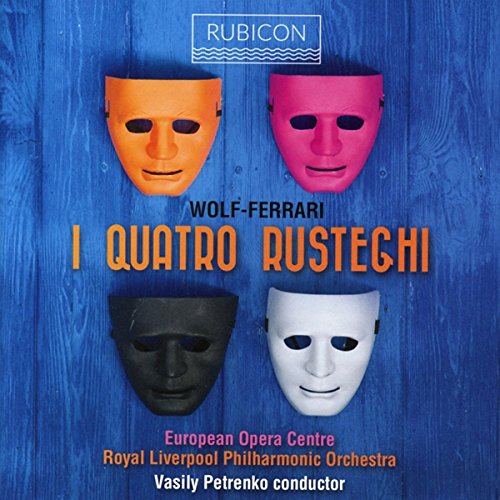WOLF-FERRARI I quatro rusteghi (Petrenko)
View record and artist detailsRecord and Artist Details
Composer or Director: Ermanno Wolf-Ferrari
Genre:
Opera
Label: Rubicon
Magazine Review Date: 09/2018
Media Format: CD or Download
Media Runtime: 131
Mastering:
DDD
Catalogue Number: RCD1024

Tracks:
| Composition | Artist Credit |
|---|---|
| (I) Quattro Rusteghi, '(The) Four Ruffians' |
Ermanno Wolf-Ferrari, Composer
Agnieszka Hauzer, Servant, Soprano Aleksandar Stefanoski, Maurizio, Bass Ana James, Felice, Soprano Daniela Degennaro, Marina, Soprano Ermanno Wolf-Ferrari, Composer Giulio Pelligra, Conte Riccardo, Tenor Mihnea Lamatic, Lunardo, Bass Mirko Quarello, Simone, Bass Roman Ialcic, Cancian, Bass Romina Casucci, Lucieta, Soprano Royal Liverpool Philharmonic Orchestra Silvia Beltrami, Margarita, Mezzo soprano Tansel Akzeybek, Filipeto, Tenor Vasily Petrenko, Conductor |
Author: Mark Pullinger
Based on a play by Carlo Goldoni (as were several of Wolf-Ferrari’s operas), I quatro rusteghi is a farce. Translated as ‘The Four Curmudgeons’ – or ‘The Four Old Gits’, to use modern slang – it’s essentially about four husbands who try to keep their women in line but are constantly outwitted to make sure that young love triumphs. The plot has shades of Falstaff but the music is a pale shadow of that autumnal Verdian masterpiece.
Gerald Larner claims in his booklet note that Wolf-Ferrari anticipated Stravinsky’s neoclassicism here but I beg to disagree. It sounds more like an opera buffa pastiche, conversational in style and without any great set pieces, although Lucieta has a pretty aria in Act 2 (disc 2, track 2). It’s fairly standard Wolf-Ferrari, I’m afraid, not unlike the tedious Le donne curiose (also in Venetian dialect).
Conducting the RLPO in staged concert performances from 2012, Vasily Petrenko goes full out on Italian charm. This was a project by the European Opera Centre and the many soloists – spanning the continent – are all young and committed. Mihnea Lamatic is suitably grumpy as the antique dealer Lunardo, trying to honour local custom by not allowing his daughter to see her bridegroom ahead of her wedding. Romina Casucci’s pert soprano makes for an engaging Lucieta. For collectors of unusual ensembles, there is a bass trio in Act 3 (disc 2, track 10).
The only competition comes on a crumbly live recording from Turin, conducted by Ettore Gracis (1969). To be curmudgeonly, this new recording understandably sounds fresher; but this is no neglected operatic gem. Ironically, it was Wolf-Ferrari’s single attempt at verismo that provided his greatest work: I gioielli della Madonna (‘The Jewels of the Madonna’).
Discover the world's largest classical music catalogue with Presto Music.

Gramophone Digital Club
- Digital Edition
- Digital Archive
- Reviews Database
- Full website access
From £8.75 / month
Subscribe
Gramophone Full Club
- Print Edition
- Digital Edition
- Digital Archive
- Reviews Database
- Full website access
From £11.00 / month
Subscribe
If you are a library, university or other organisation that would be interested in an institutional subscription to Gramophone please click here for further information.




